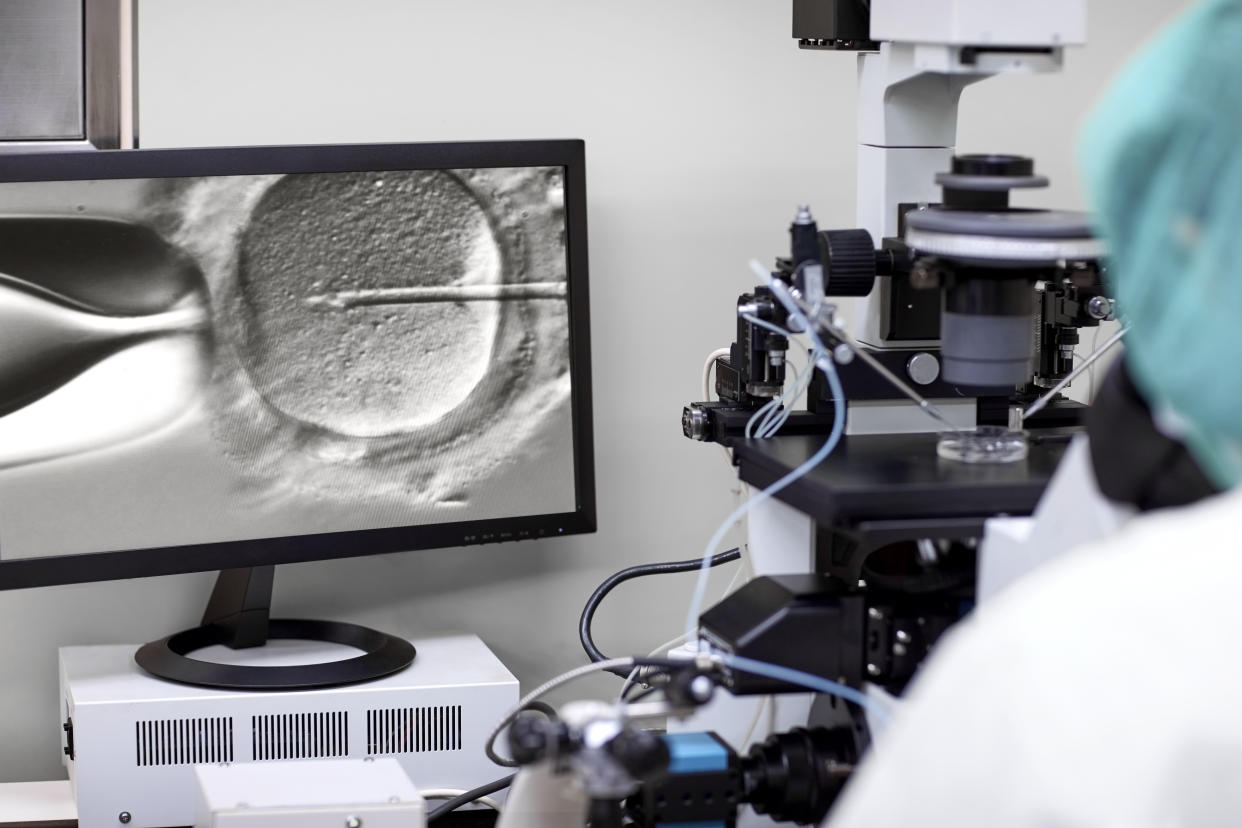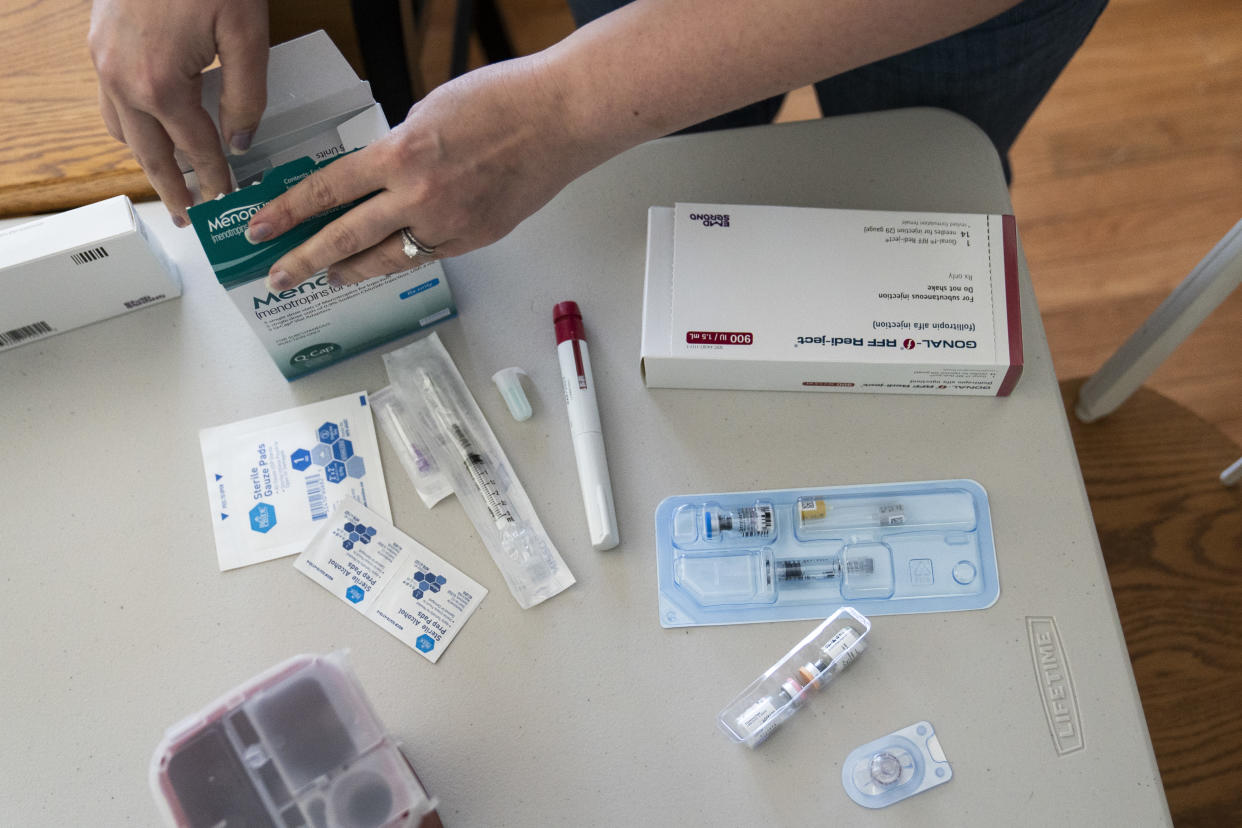Abortion bans could impact access to IVF after Roe v. Wade overturned, experts say
Since the U.S. Supreme Court overturned Roe v. Wade — the 1973 ruling that established abortion as a constitutional right — patients suffering from infertility and their doctors have grown concerned that fertility treatments, particularly IVF, could be affected by new state abortion bans.
At least 13 states, many of which had so-called trigger laws in place, have completely banned or severely limited abortions since the high court ruling on June 24, and more are expected to ban the procedure. According to the Guttmacher Institute, a research organization that supports abortion rights, 26 states are certain or likely to ban abortion now that Roe has been repealed.
While the main target of these bans is to restrict abortion care, fertility and legal experts say that without the protection of Roe v. Wade, state lawmakers could introduce abortion legislation that could potentially threaten access to family-building treatments such as IVF.
“I’m worried that in the zealous attempt to pass abortion laws as quickly as possible that some reproductive medical procedures will be caught up in the crossfire,” said Jody Madeira, the co-director for the Center for Law, Society & Culture at Indiana University’s law school and an expert on IVF and law.
What is IVF?
IVF — which stands for in vitro fertilization — is part of a family of fertility treatments known as assisted reproductive technology, in which eggs are retrieved from a woman’s ovaries and are combined with sperm in a laboratory. Once fertilized, some develop into embryos that can then be transferred to a woman’s uterus, where if successfully implanted, can result in a pregnancy. However, not all eggs that are retrieved always fertilize normally. This is why during a cycle of IVF, multiple embryos are typically created in order to have a pool of healthy embryos to choose from. Doctors generally implant only one or two embryos in the uterus at once.
Most IVF clinics give couples the option to conduct genetic testing on these embryos before transferring one or two into the woman’s uterus, to ensure that there are no chromosomal anomalies or diseases. Couples who plan on having more than one child are also given the option to freeze the remainder of the embryos for future use. However, some couples choose to discard them and others choose to donate them.

Who can benefit from IVF?
Approximately 1 in 8 couples is affected by infertility in the United States. IVF, which has been around since the late 1970s, has allowed hundreds of thousands of heterosexual couples struggling to conceive, as well as same-sex couples and those who are single but want children, to build their families. According to CDC data, about 2 in every 100 children born in the United States every year are conceived through IVF.
How did the Supreme Court’s decision to overturn Roe v. Wade affect fertility treatments?
At the moment, IVF is not affected by the reversal of Roe and continues to be accessible in all 50 states and Washington, D.C., according to Resolve: the National Infertility Association, an infertility advocacy organization.
The American Society for Reproductive Medicine, which represents numerous fertility treatment providers in the country, also recently released a report that analyzed 13 of the so-called trigger laws. According to the organization, these laws do not pose a threat to infertility patients and their health care providers at the moment.
Why would IVF be at risk after the reversal of Roe v. Wade?
However, advocacy groups, doctors and legal experts worry that many states are looking to ban abortions starting from conception or when the egg is fertilized, without explicitly making a distinction between fertilization that occurs inside a woman’s uterus vs. in a lab, as is the case with IVF. This could by default restrict or end IVF in some states, they say.
“I think what we’re going to see are a lot more states who say life begins at fertilization, life begins at conception,” Madeira told Yahoo News. “From the moment of fertilization or conception, that particular embryo, if it doesn’t state otherwise — whether or not conceived in vivo, [meaning] inside the uterus, or ex vivo, [meaning] outside the uterus — is actually a human being. You would specifically have to exempt IVF in order to keep this procedure safe. Legally, doctors will, I think, really pull back if these clarifications are not made,” she added.
Dr. Stephanie Gustin, a fertility doctor and medical director of the Heartland Center for Reproductive Medicine in Omaha, Neb., told Yahoo News that since Roe v. Wade was overturned, calls from worried patients have increased.
“We’re getting calls daily and multiple times throughout the day as to, ‘I was going to start treatment, should I start treatment still? I’m in the middle of treatment. Should I continue my treatment? I have embryos frozen. Are they safe?’” Gustin said.

Potential legal risks ahead
Gustin’s biggest concern, she says, are bans centered around personhood, which would give embryos the legal status of a live human being and could make fertility treatments like IVF illegal.
“Less than 20% of these initial fertilized eggs or embryos actually develop into a baby,” she said. “So by giving those, you know, very early cells that have exhibited fertilization the same rights [as a person] and then criminalizing anything that is associated with any destruction of that life is problematic,” she said.
More than 100 bills attempting to give legal “personhood” status to embryos have been proposed by states as well as the federal government in the past decade, according to Resolve. However, none have passed. But legal experts for the American Society for Reproductive Medicine believe that “fetal personhood” legislation “may become more common in a post-Roe world.”
Madeira says if such laws are passed, it will raise a lot of legal questions regarding the embryos created in a lab during an IVF cycle.
“The questions include, you know, can embryos be tested? Can you select embryos based on certain characteristics? For example, you can’t right now in many states abort a fetus for a reason such as Down syndrome. Can you destroy an embryo for reasons such as Down syndrome? Can you choose not to transfer an embryo for reasons such as Down syndrome?” Madeira said. “If we’re treating these as human beings, those laws already have parallels in abortion context,” she added.
Gustin says that handling, freezing or storing, as well as discarding embryos, which are all common practices in this field of medicine, are things that will come into question.
“Not every single embryo survives the thaw. We have excellent survival rates; over 99% of our embryos that were previously frozen survive the thaw, but it is not 100%, and so if we were to go and thaw an embryo and that embryo did not survive, would we then be culpable?”
Anti-abortion groups ‘researching’ IVF
Spokespeople from four groups in the United States who oppose abortion have said in interviews with the New York Times that even though they believe all embryos are human beings, regulating IVF was not something at the top of their list.
However, some anti-abortion groups have already expressed a desire to look into IVF practices more closely.
“Protecting life from the very beginning is our ultimate goal, and in this new legal environment, we are researching issues like IVF, especially considering a business model that, by design, ends most of the lives conceived in a lab,” Kristi Hamrick, a spokeswoman for Students for Life Action, a large national anti-abortion group, recently told the Times.
Now more than ever, infertility, which Gustin said is “a very personal journey,” needs a face.
“We need our entire country aware of this issue, aware of the fact that these broad sweeping abortion bans could impact a couple’s or a person’s desire to be a parent, and that wasn’t the intent, or shouldn’t be the intent, of these bills,” she said.

